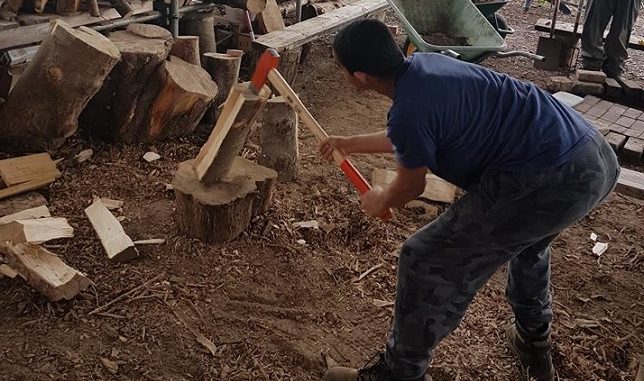
Thanet Community Forest School in Dane Valley is branching out to offer social and therapeutic horticulture sessions for adults with learning disabilities.
The school, created by St Anthony’s teacher Luke Evans, opened in January and teaches youngsters about the natural environment.
It is based on a former landfill area which has been turned into a young woodland with nearly 6000 trees planted in the last decade.
TCFS use the 13 acre site as its outdoor class to teach children about sustainability, ecology, conservation and the environment within a forest school teaching ethos.
It is a registered charity set up to provide free places to children from deprived backgrounds and also holds family workshops but now wants to be even more inclusive.
Adults taking the sessions are those that have been assessed by social services as needing care and support.
The sessions are paid through via personal budget allowances.
Luke said: “ We are a small charity with big dreams based at Dane Valley Woods in Margate. Since January we have been offering a range of provision from work experience placements for school leavers to Forest School sessions for three year olds.
“We are fully inclusive and embrace everybody onto our site which is why we have decided to take this ethos further with our latest offering of provision for adults with special educational needs. We offer a purposeful occupation, helping transform a wasteland into a woodland, learning basic horticulture skills and being person centred.
“We have found gardening a wonderfully flexible medium that can transform lives and we see first-hand how it can help participants, regardless of age or ability.”
Social and therapeutic horticulture is the process of using plants and gardens to improve physical and mental health, as well as communication and thinking skills. It also uses the garden as a safe and secure place to develop someone’s ability to mix socially, make friends and learn practical skills that will help them to be more independent.
Luke said: “Using gardening tasks and the garden itself, we build a set of activities for each participant to improve their particular needs and to work on certain goals they want to achieve.”
The benefits of gardening include:
Better physical health through exercise and learning how to use or strengthen muscles to improve mobility
Improved mental health through a sense of purpose and achievement
The opportunity to connect with others – reducing feelings of isolation or exclusion
Acquiring new skills to improve the chances of finding employment
Feeling better for being outside, in touch with nature and in the ‘great outdoors’
Social and therapeutic horticulture can benefit people in a number of ways:
It can be part of a person’s rehabilitation process, to help them recover and finding their way in life again after an illness or a difficult time in their lives
It can help people recover from a wide range of physical and mental conditions
It can help people to learn new transferable skills
Can help slow down the deterioration seen when someone has a degenerative illness.
Social and therapeutic horticultural also benefits people with disabilities including those recovering from stroke and heart disease, blind and partially sighted people, those in the early stages of dementia, and people with physical and learning disabilities.
Adults taking the sessions can also learn photography and take part in arts and crafts activities.
To find out more about what TCFS offer find them on facebook here or visit the website at www.thanetcommunityforestschool.co.uk



